Image
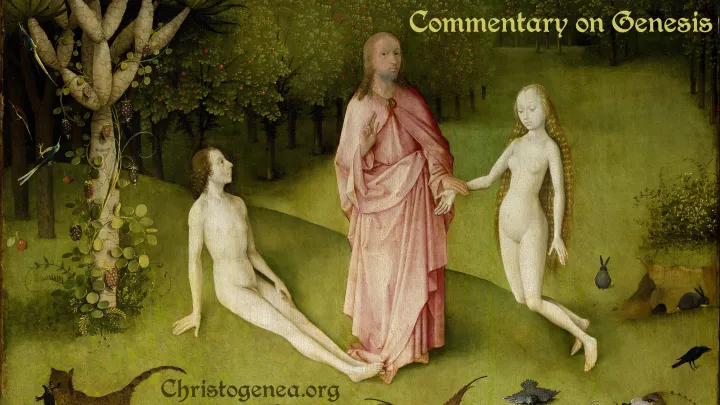
Christogenea is reader supported. We are very much in need of support at the moment, as recent months have been difficult. If you find value in our work, please help to keep it going! See our Contact Page for more information!

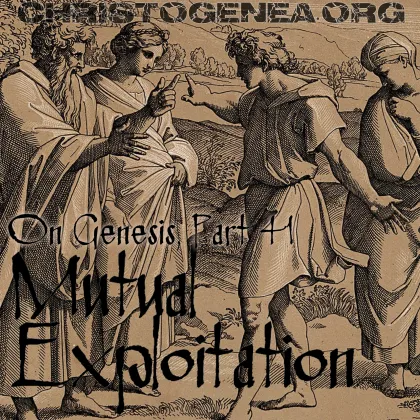
On Genesis, Part 41: Mutual Exploitation
As we have seen in Genesis chapter 29 and the marriage agreement between Jacob and Laban for his daughter Rachel, Laban had exploited Jacob by burdening him with seven years of labor in exchange for her hand, which was a condition to which Jacob had rather eagerly agreed. That alone seems to have been excessive, since ninety years earlier, Laban’s father Bethuel had required nothing from the servant of Abraham in exchange for giving him Rebekah as a wife for Isaac. There in Genesis chapter 24, where the servant had asked for Rebekah and had given Bethuel and Laban an account of his experiences and the visions which he had, we read in part: “50 Then Laban and Bethuel answered and said, The thing proceedeth from the Lord: we cannot speak unto thee bad or good. 51 Behold, Rebekah is before thee, take her, and go, and let her be thy master's son's wife, as the Lord hath spoken.” Then as we read in the subsequent verses, the servant had given gifts to Rebekah’s mother and brother, this same Laban who had burdened Jacob here, but he had evidently given nothing to Bethuel, Rebekah’s father, and apparently Bethuel required nothing of him.
So even after laying a comparatively excessive burden on Jacob, Laban went even further and had exploited him by burdening him far beyond the seven years to which he had agreed. First, he deceived Jacob by having him marry Leah rather than Rachel, and by that action he then compelled him further, to work seven additional years for Rachel, whom Jacob had evidently already professed to have loved. This we read in Genesis chapter 29: “20 And Jacob served seven years for Rachel; and they seemed unto him but a few days, for the love he had to her.” So Jacob, who could not deny his love, actually had worked fourteen years for Laban’s daughter Rachel, and none for Leah, whom he obtained by Laban’s choice and not by his own. In contrast, Isaac did not have to lift a finger to marry Rebekah, who only cost Abraham the journey of some servants and a few choice gifts. While we may never know whether or not that was his reason, Isaac had apparently sent Jacob to Haran empty-handed, as he is not recorded as having had any gifts for a prospective bride and her family.
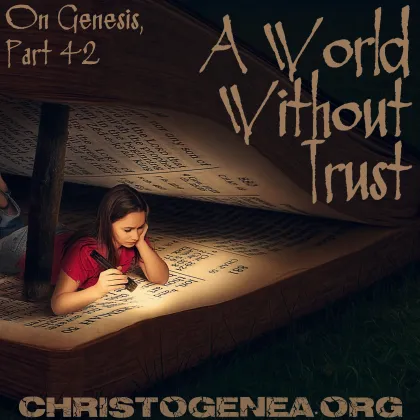
On Genesis, Part 42: A World Without Trust
Once Jacob had married both Leah and Rachel, and had twelve children born to him in Haran, he had wanted to leave there, but his father-in-law Laban had begged him to stay. So as the account goes in the later half of Genesis chapter 30, after Laban had admitted to Jacob that he himself had profitted greatly on account of his presence he had then asked him to remain. Upon answering him Jacob only agreed to remain under the condition that he could keep to himself certain of the cattle as payment in exchange for his labor. So Laban agreed, and perhaps he was only eager to accept the offer because Jacob’s demand for payment in the speckled, spotted, grisled and striped cattle of the flock must have seemed as if it would be even more profitable to him than to Jacob. However unbeknownst to Laban, Jacob had a dream, where the God of Bethel, the God of his fathers, had appeared to him, and while it is not stated explicitly, in that dream he must have been shown how to increase the ratio of such cattle exponentially among the kids of the flock, a claim which is established by Jacob’s subsequent actions.
Presenting that account, we had long digressions in order to present information from studies in a field called epigenetics. There, we sought to demonstrate how certain substances in the wood which Jacob had placed into the watering-troughs of the cattle could indeed cause certain genes which are otherwise latent to express themselves in the kids of the flock, and that is how Jacob’s dream was fulfilled. Not only would the cattle drink the water in which the wood had been soaked, but they would very likely eat of the bark and of the wood itself, as sheep and goats frequently do eat trees. This may seem like magic, and in earlier ages, before the advent of genetic science, it must have seemed that way, but now there is a simple and natural explanation which stands as a proof that the provenance of our Scriptures certainly is found in Yahweh our God. While it is certain that Jacob did not understand epigenetics, he did know to strip some of the bark from young saplings and place them in the watering troughs, and the knowledge of the operations of nature which is found in God had caused the desired effect.
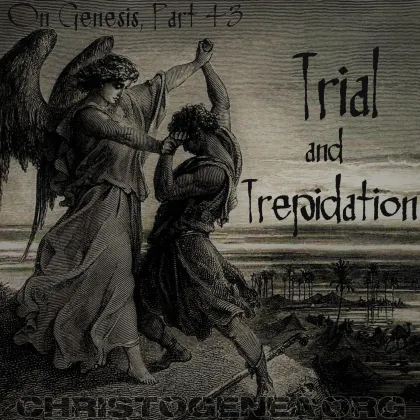
On Genesis, Part 43: Trial and Trepidation
Before we commence on the next portion of our Genesis commentary, we should have a short digression to illustrate some of the challenges involved in writing a commentary. Discussing Genesis as it is found in the King James Version, it is certainly tedious to explain in detail every reading which differs from other versions, or even from the Septuagint alone. So minor differences in the text of Genesis chapter 31, such as in verses 13 and 24, had been purposely neglected when we discussed that chapter at length. This has probably been the case with many places in Genesis. So while there are others we shall discuss presently, here I will begin with brief examples of these two verses. In verse 13 where Jacob had given his wives the account of how he had gained such a great number of cattle from their father, Yahweh is recorded as having assured him that if he left to return to Beersheba, that “I will be with thee.” Those words are wanting in the Masoretic Text, but the assurance is given in other promises which Yahweh had made to Jacob. In verse 24 where Yahweh had warned Laban not to harm Jacob in a dream, He is recorded as having said to him “Take heed to thyself that thou speak not at any time to Jacob evil things.” In the Masoretic text it is “either good or evil” in that warning. These differences are immaterial in the greater context of the account.
Furthermore, the patterns of the cattle which Jacob had bred are sometimes interpreted differently, or even rather strangely in the Septuagint. For example, where there is a Hebrew word translated as ringstraked in the King James Version, in Brenton’s translation of the Septuagint in verse 35 of Genesis chapter 30 it is white, but it is apparently streaked in verse 39, and speckled in verse 40. Then in chapter 31 it is white again in verse 8, striped in verse 10 and speckled in verse 12. This does not reflect upon Brenton, as there are different Greek words in those places, which were evidently different interpretations of the meaning of the Hebrew word, unless the original manuscripts employed were themselves different – something at which we would not be startled. But since it does not change our interpretation of the meaning of the account, it is not worth the effort which it would require to map out every Hebrew and corresponding Greek word in order to explain in detail every little difference between the ancient texts.
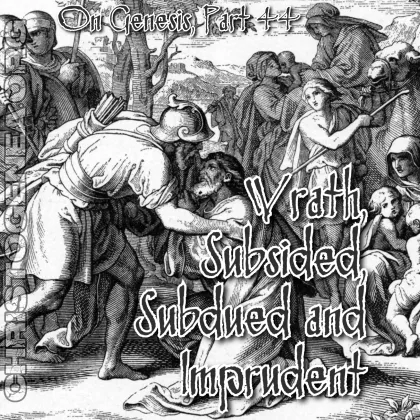
On Genesis, Part 44: Wrath, Subsided, Subdued and Imprudent
Since his departure from Haran and the house of Laban his father-in law, at this point in our Genesis account Jacob has faced two of the three trials which he would have even before he had reached Canaan. First, he was accosted by Laban himself, on account of the missing idols which Rachel had taken from her father. Then, he was compelled to wrestle with a strange man in the middle of the night, who with all certainty was an angel of Yahweh God, but whom Jacob had imagined to have been God Himself. Of these trials, Jacob apparently had no warnings. But he stood up to Laban and his injustices, and Laban could only answer by compelling Jacob to make a covenant with him. Then he stood up to the angel, and he even compelled the angel to bless him, which he did. Now Jacob will have to face his brother Esau, and already he has had much fear and trepidation. It was on account of Esau that twenty years earlier he had fled to Haran, as Esau had threatened to take his life. So his own parents had sent him away, warning Jacob, and now Jacob must remember the threat. In spite of the fact that Jacob was magnified greatly during his time in Haran, initially he went there on account of the wrath of Esau.
Following the meeting with Laban, two encounters with angels which Jacob had along the way since he had left Mount Gilead must have served to help prepare him for his encounter with Esau. The first was when he had seen a double encampment of angels, whereafter having heard that Esau was going to meet him with four hundred men, with trepidation Jacob had split his own party into two camps in preparation for that meeting. The second was after he had wrestled with the angel, and he had imagined that he had seen the face of God. So now, when Jacob meets with Esau, he imagines that same thing of his brother, and he expresses it, even having treated Esau as if he were God. At a much later time, Christ Himself had taught that men should treat one another in the same manner in which they would treat him, for example in the parable of the sheep and the goats.
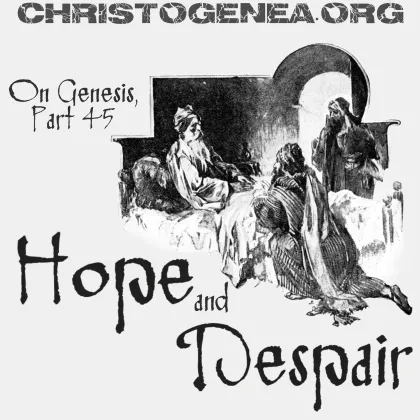
On Genesis, Part 45: Hope and Despair
One important lesson which we should all find in the story of Jacob Israel is that in spite of his having had the hope of the promises of Yahweh God, he still had to live with the despair of being in this world. So after he had returned to Canaan from Haran, his daughter was raped by his enemies, at least several of his sons had disappointed him in various ways, even having violated his marriage bed, and among other things, as we shall also encounter here in Genesis chapter 35, his most beloved wife had died giving birth to his last child. If Jacob had suffered these things, having inherited the promises of Abraham and having had the direct blessings of his God, and yet he persisted in obedience to God, then Christians should know beforehand that they shall also suffer these things, and that they must also persist in the faith which Jacob had exhibited. No Christian apart from Christ Himself is better than Jacob, a man who was described by Moses as having been perfect or complete, even if in the King James Version the word is mistranslated as “plain” in Genesis chapter 25 (25:27).
For this same reason, Paul of Tarsus had written in Romans chapter 8, speaking of the creation of God found in the children of Adam, “16 That same Spirit bears witness with our Spirit, that we are children of Yahweh. 17 And if children, then heirs: heirs indeed of Yahweh, and joint heirs of Christ; if indeed we suffer together, that also we will be honored together. 18 Therefore I consider that the happenstances of the present time are not of value, looking to the future honor to be revealed to us. 19 Indeed in earnest anticipation the creation awaits the revelation of the sons of Yahweh. 20 To transientness the creation was subjected not willingly, but on account of He who subjected it in expectation 21 that also the creation itself shall be liberated from the bondage of decay into the freedom of the honor of the children of Yahweh. 22 For we know that the whole creation laments together and travails together until then.” Christ Himself expressed this same sentiment in His Revelation, in chapter 21 where John had described his vision of the descent of the City of God and we read: “3 And I heard a great voice from out of the throne, saying: ‘Behold! The tabernacle of Yahweh is with men, and He shall dwell with them, and they shall be His people, and Yahweh Himself shall be with them, 4 and He shall wipe every tear from their eyes, and death shall not be hereafter, nor grief, nor crying, nor toil, it shall be no longer: the former things have departed!’”
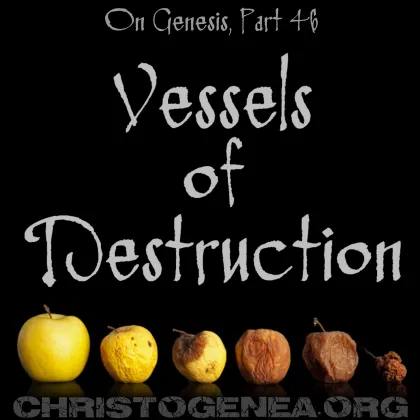
On Genesis, Part 46: Vessels of Destruction
The literary style which Moses had employed in Genesis serves a specific purpose, as it relates a family history from Adam through Noah and his sons, which contains just enough information so that the children of Israel may know from where they had come, so that they may recognize those nations to whom they were related, and so that they may be warned concerning those to whom they were not related, or at least, not fully related. Then, after a space of at least thirteen hundred years concerning which there are only a few vague statements, it continues with an account of the family of one man, Abraham, and over a period of two generations the focus is narrowed to Jacob, whom, at this point in Genesis chapter 35, has now been renamed as Israel, or “he who prevails with God”.
Interwoven in accompaniment with this outline of history are descriptions of primordial events which are presented in a manner that the society of the children of Israel may use them as foundational documents. Writing Genesis, Moses must have already expected the children of Israel to utilize these accounts as the primary elements of their education, a sort of constitution, so that they may form a Godly worldview which is tailored according to a pattern which is presented in the Word of Yahweh their God, who had led them out of Egypt, and govern themselves in a manner which He had deemed appropriate. But Genesis itself is actually only a preamble to that constitution, since the later books of Moses which contain the law along with the early history of Israel as a developing nation are all predicated upon the Genesis account, and they had all been instrumental in the function of Israel as a society, containing the formative document of the nation in Exodus as well as the laws by which they were expected to be governed.
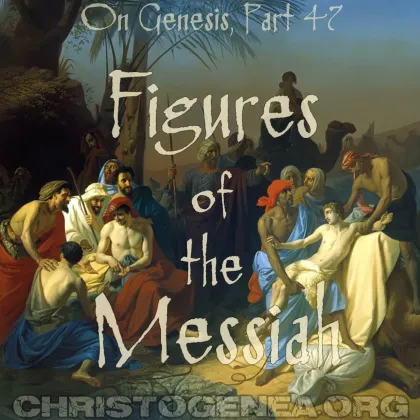
On Genesis, Part 47: Figures of the Messiah
In our last presentation of this commentary, Vessels of Destruction, we had discussed Genesis chapter 36, where there was a break in the narrative of the life of Jacob so that Moses could conclude his account of Jacob’s early years. So following the death Isaac he had then described the progeny of his brother Esau. Where Moses had listed the descendants of Esau, in addition to his Hittite wives it was also apparent that at least one family of the Horites were intermingled into his genealogy, and both Esau and his son Eliphaz were described as having taken wives from of that family. Then, comparing the earlier mention of Esau’s first wives in Genesis chapters 26 and 28, it is evident that over the course of time the situations with his wives had changed, and the offspring which are described in Genesis chapter 36 are from wives other than those, so the concise and incomplete account beckons questions for which there will probably never be answers.
But from the beginning, it is evident that the Edomites were mixed with two different branches of the Canaanites, both the Hittites and the Horites. However even this seems to be contradicted much later in Scripture, in Deuteronomy chapter 25 where we read that “12 The Horims also dwelt in Seir beforetime; but the children of Esau succeeded them, when they had destroyed them from before them, and dwelt in their stead; as Israel did unto the land of his possession, which the LORD gave unto them.” This is repeated again, in part, a little further on in that same chapter. So while it seems to contradict the fact that Esau and his sons had intermarried with the Horites, the circumstances are not mutually exclusive. The Edomites evidently had displaced the Horites, since there is no apparent record of a specifically Horite or Hurrian presence having been prevalent in Mount Seir in later times. But at the same time they took their women as wives to the extent where one family of the Horites had been incorporated into Edom, and since so many Horite men are reckoned along with the genealogy of Esau, it is certainly plausible that they also had taken of the daughters of Esau.
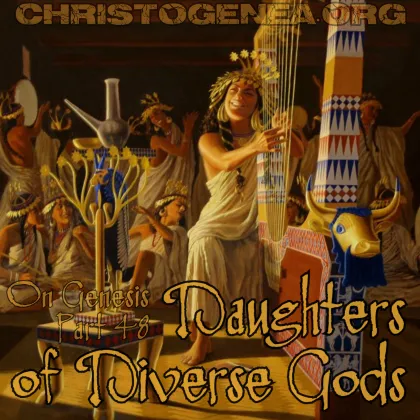
On Genesis, Part 48: Daughters of Diverse Gods
In Genesis chapter 37 Moses had described the plight of Joseph, as he was despised by his brothers and left in a pit to die, but he had instead been taken by Midianites and sold as a slave to the Ishmaelites and then to the Egyptians. However since his brothers did not know with certainty what had happened to him, they created a tale whereby Jacob was convinced that he was dead. Joseph went to Egypt at age seventeen, as the text of that chapter informs us, and Jacob will find him in Egypt when he is about forty years old, as later chapters in Genesis also inform us. But now, here in Genesis chapter 38, Moses will give us an account of the early life and children of Judah, and this account is written in such a way that by it we may know that Judah had illegitimate children, whereby he had sinned to the same degree as Esau, his uncle, had sinned. However in the circumstances which followed, Judah was treated more mercifully than Esau, and his errors resulted in his also having had legitimate children, which he did not plan on having, so that he would have a name in Israel. In the end, Judah had two wives, and each of them were daughters of diverse gods.
But once again we must state that these events are not described in a perfectly chronological order, in spite of the fact that Moses had presented them in an ordered sequence. This is a methodical approach whereby he did not have to jump back and forth from subject to subject. At the point when Joseph is seventeen years old, Judah could have been no older than twenty-five or perhaps twenty-six. He was the fourth son of Leah, whom Jacob had married after he had been in Haran for seven years. So we may assume that unless Leah gave birth to twins, something of which we are not informed, then Judah, her fourth son, was born some time around Jacob’s eleventh or twelfth year in Haran, whereas Joseph was born towards the end of the twenty years during which Jacob would be in Haran. So it is safe to conclude that Judah is about eight or nine years older than Joseph, and if we are a year or so off in either direction, the difference is immaterial so long as we bear in mind the possibility.
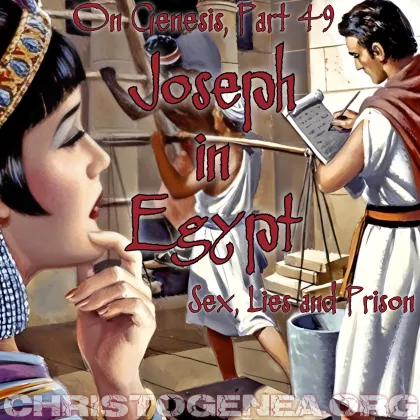
On Genesis, Part 49: Joseph in Egypt, Sex, Lies and Prison
Thus far in these chapters describing the lives of the sons of Jacob, we have observed a notable contrast which is illustrated in the accounts of the circumstances of Joseph and Judah, of which certain aspects continue to be illustrated both here in Genesis and in the words of the later prophets. Here we have seen that in Joseph are Figures of the Messiah, as many aspects of the life of Joseph are certainly types for the ministry Christ Himself. Joseph was cast into a pit and left for dead by his brethren, but he was taken out of it and as a result he had become a temporal savior of his people. But Judah, who was present when Joseph was thrown into the pit, had made choices in his own life which had both been a cause of and had served as a type for the circumstances of the later Kingdom of Judah as well as the Judaea of the time of Christ. Where Judah had sexual relations with the Daughters of Diverse Gods he had sired legitimate sons in Pharez and Zarah, but he had also had illegitimate descendants through Shelah, the only surviving son which he had with the Canaanite woman. Then, quite ironically, Judah did not intend to have children with Tamar, as he thought that he was only sleeping with some random whore, and there are probably further analogies which may have been made with that circumstance. Later in the writings of Moses, the sin of Judah would become apparent in the law, and then in instructions to the children of Israel invading the land of Canaan.
However Judah remained responsible for his remaining Canaanite son, so the descendants of Shelah remained with Judah, subsequently they were listed in the accounts of the families of Israel in the Book of Numbers, and their dwelling places in and around the territory of Judah are described in 1 Chronicles chapter 4. In that chapter, in a context which is perhaps 250 years later, it was described that many of them had dwelt in Chozeba, which is ostensibly the same place as Chezib, the place where Judah’s Canaanite sons had been born. Both towns were in the same area, and each of the names had been translated from similar forms of the same word, which means falsehood. That is a fitting place for them, since having been Canaanites they would indeed be sons of falsehood.
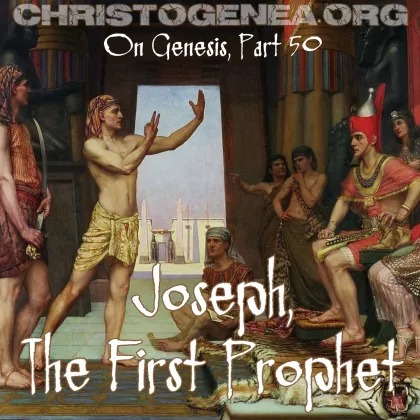
On Genesis, Part 50: Joseph, The First Prophet
As we have already seen in Genesis chapter 39 where we had discussed Joseph in Egypt, Sex, Lies and Prison, after an unspecified time as the steward of his master’s house in Egypt, Joseph was put in prison among the prisoners of the pharaoh, on account of his alleged attempt to violate the wife of Potiphar. Evidently Potiphar, an officer in the court of the pharaoh, had apparently had the authority to commit prisoners into the prison of the king. However Yahweh had blessed Joseph, and he became a steward of the prison, a sort of trustee, which is an inmate who is given certain responsibilities within a prison. Even today this is a popular phenomenon in modern jails and prisons, and it is often a significant aspect of their daily operations.
It is very likely that during this time, Joseph still had in mind the dreams which he had communicated to his brethren some years before. As it is recorded in Genesis chapter 37, “6 And he said unto them, Hear, I pray you, this dream which I have dreamed: 7 For, behold, we were binding sheaves in the field, and, lo, my sheaf arose, and also stood upright; and, behold, your sheaves stood round about, and made obeisance to my sheaf.” Then he told them again, “9… Behold, I have dreamed a dream more; and, behold, the sun and the moon and the eleven stars made obeisance to me”, and his brothers despised him for those dreams, precipitating the events by which he had become a slave in Egypt.
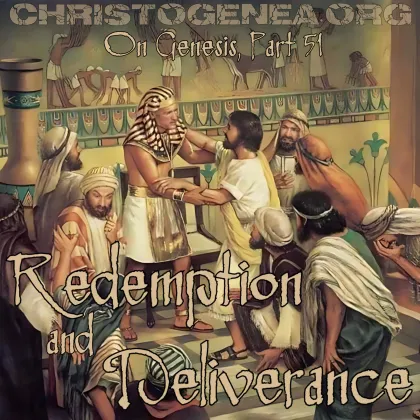
On Genesis, Part 51: Redemption and Deliverance
We have already discussed the Figures of the Messiah which are evident in the life of Joseph, the accounts of which certainly contain several prophetic types for Christ, and we shall see further examples of that as we proceed through Genesis. But in one significant aspect the life of Joseph is not only a prophetic type for Christ, but also a type, or perhaps a prototype, for the subsequent history of the children of Israel in Egypt. As Joseph went to Egypt against his own will, became a servant, ended up in prison, and was freed and this elevated to an exalted position, so would Israel enter Egypt under constraint and become a nation enslaved and in a sort of prison. But ultimately, like Joseph, the nation had been liberated by Yahweh, and eventually elevated to an exalted position. So in that respect, the life of Joseph in Egypt serves as a prophetic type for the history of Israel in Egypt. Then, as we shall see in subsequent chapters, it shall also further serve as a type for Christ in ways which are far beyond the parallels which we have already observed. So among other things, Joseph shall ultimately serve as a prophetic type for the absolute mercy and salvation which Christ has promised to all of Israel.
Now, as it is described in Genesis chapter 40, Joseph had dreamed dreams, much like the prophet Daniel, and Joseph could also interpret dreams, just like the prophet Daniel. So his discernment which he had exhibited in the interpretations of dreams while in prison would be his introduction to the pharaoh of Egypt, which is where we are presently in Genesis chapter 41. Having successfully interpreted the pharaoh’s dream, Joseph was elevated to a position in his government. Much later, Daniel had apparently earned a reputation for discernment as a young man in Babylon, which is represented in the story of Susanna, and having already been introduced to Nebuchadnezzar, in Daniel chapter 1, he later found an audience with the king and interpreted his remarkable dream of the metallic image which represented four great kingdoms, as it is described in Daniel chapter 2. For that Daniel was also rewarded and elevated into the government of his captors. So within the life of Joseph are found patterns which are repeated throughout later Scriptures, and that is one of the wonders of this book which we call the Bible, because once all of these patterns are noticed all we can do is marvel in awe at the wisdom of Yahweh our God, who is the Author of all of these things.
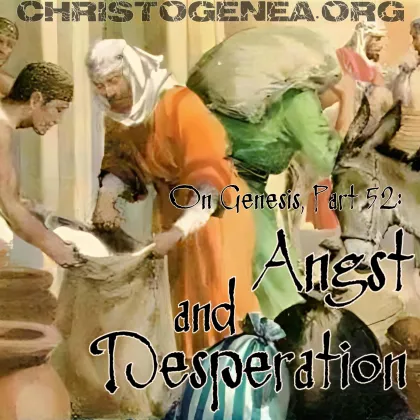
On Genesis, Part 52: Angst and Desperation
As we have illustrated in our discussions of each of the events in the life of Jacob, in only a few years from the time that he had entered Canaan his daughter Dinah had been raped, and Jacob had been angered by the rash manner in which Simeon and Levi had avenged their sister. Then his son Judah had run off and taken residence with a Canaanite woman, where he had stayed in Chezib, a place which is literally named falsehood, while having had his three sons with her. His eldest son Reuben had sinned against him by having slept with one of his wives. His son Joseph was esteemed to have been killed, and he never knew that his other sons had lied to him about what had actually happened. Then in addition to all of these things, his favorite wife, the only one whom he was said to have loved, had died at a relatively young age, shortly after she had given birth to his youngest son, whom he named Benjamin.
So even though Yahweh his God had promised to be with him after he departed from Haran, Jacob had continued to experience both Hope and Despair, as we had titled part 45 of this Genesis commentary, because in spite of the fact that he had inherited the wonderful promises which Yahweh God had made to Abraham, that his seed would inherit the world, and he himself was reassured those promises, as it is recorded in Genesis chapter 35, he nevertheless had to suffer the circumstances of the evil world into which he had been brought. Modern Christians should take note of this, and consider what Jacob had suffered when they themselves suffer, because having the promises of God obviously does not make anyone immune to suffering. None of us are better than Jacob, who continued to trust in God regardless of his suffering.
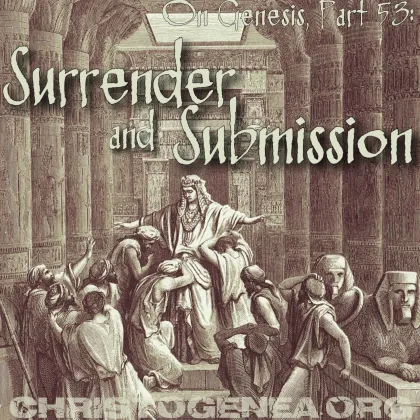
On Genesis, Part 53: Surrender and Submission
As we have progressed through these later chapters of Genesis and the life of Joseph in Egypt, we have attempted to illustrate the many ways in which events in the life of Joseph had been Figures of the Messiah, where it becomes evident that the account of the life of Joseph serves as a prophetic type for the ministry and purpose of Yahshua Christ. Now here we shall also venture to assert that the very circumstances under which Jacob and his sons had been compelled to submit to Joseph and go to Egypt for salvation from the famine also foreshadow the circumstances by which all of the seed of Israel, in these last times, shall ultimately find their salvation in Christ. So in that manner, Jacob and his sons are a prophetic type for their own future descendants.
First, Israel was found in Angst and Desperation as the seven years of famine pressed on, and even more so when his sons had returned from Egypt and he received word that the governor of the place had demanded to see Benjamin. The anxiety which he apparently must have suffered was on account of the famine, and then the prospect of losing his son, which is manifest where he said “Joseph is not, and Simeon is not, and ye will take Benjamin away”, in response to Reuben’s pleas. So Jacob steadfastly refused to comply with the Egyptian governor’s demands and vowed to Reuben that “my son shall not go down with you”, referring to Benjamin in the closing verse of Genesis chapter 42. In that same place, he also attested that “his brother is dead”, speaking in reference to Joseph. Where he said “Simeon is not”, it is evident that he would have even preferred to have written Simeon off as dead rather than risk losing the second son born of his beloved wife Rachel.
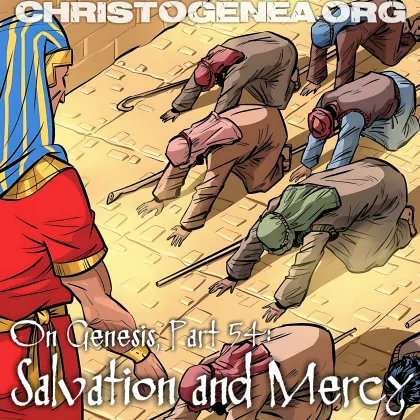
On Genesis, Part 54: Salvation and Mercy
Discussing Genesis chapters 42 and 43, where it is described that a grievous famine had persisted throughout the world of Jacob and his sons, we have commented at length on the Angst and Desperation that they must have suffered on account of it, as well as the Surrender and Submission that they were compelled to make before the governor of Egypt, so that they could obtain food and survive the famine. But upon their having done that, they were a special case, because Joseph had recognized them and treated them accordingly, but they did not recognize Joseph. The Scriptures were always written with a focus on the central characters with which it is concerned. So what we are not told in Scripture is that in the background, many other people from Canaan must have also journeyed to Egypt seeking to buy grain, and that must have also been how Jacob had initially even heard that there was grain in Egypt. But those who had bought it and traded it in Canaan would have sold it at a considerable markup, and for that reason it is very likely that Jacob had wanted his sons to go to Egypt and buy it for themselves.
Now here in Genesis chapter 44, before they would attain to any Salvation and Mercy, from their perspective the prospects of emerging from the famine unscathed must have been even more dismal, since at this point in Genesis, Benjamin had been charged with having stolen the governor’s silver goblet. However, as we had described the prophetic parallels with the history of the later children of Israel in relation to Christ which are found throughout these accounts, this situation also serves as a lesson for Christians today.
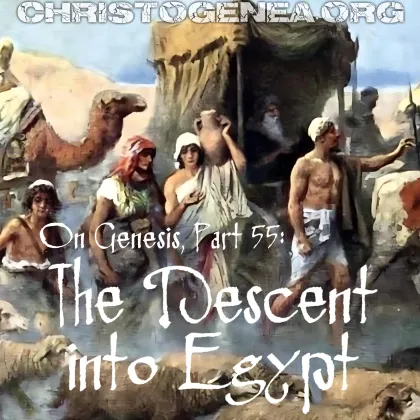
On Genesis, Part 55: The Descent into Egypt
As we may have already stated too frequently over these past several presentations in this Genesis commentary, we hope to have illustrated all of the ways in which Joseph was a prophetic type for Yahshua Christ, and the salvation of the children of Israel which is promised in Christ. However even more parallels may be made in this regard, and other avenues may be explored. Here, the children of Israel attained salvation from the famine because they had obeyed a worldly ruler, but even if they did not know it at the time, that ruler was Joseph their brother.
Then, while they were indeed preserved in Egypt, at the same time, and unbeknownst to Joseph himself, they were also being led into captivity in fulfillment of the words which Yahweh had spoken to Abraham in Genesis chapter 15 where we read: “13 And he said unto Abram, Know of a surety that thy seed shall be a stranger in a land that is not theirs, and shall serve them; and they shall afflict them four hundred years; 14 And also that nation, whom they shall serve, will I judge: and afterward shall they come out with great substance.”
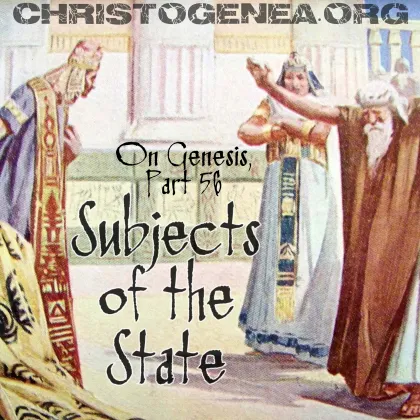
On Genesis, Part 56: Subjects of the State
In March of 2009, one of the first articles I had published on the Christogenea website, which at that time was only two months old, was titled Who is your god? The article was actually written a year or so before I created the website. In June of 2018, that same article became the basis for Part 39 of my presentation of the Protocols of Satan, which bore the same title. The premise of the article is that America had begun as a Christian nation, but was slowly secularized and descended into humanism. Then, when the trial of the so-called Great Depression had come, Americans looked to the government for their salvation rather than to Christ. So the government, beginning with the so-called New Deal of the Roosevelt administration, was happy to oblige them, instituting many new social programs which had promised to save Americans out of their poverty, and assure their futures. As Americans accepted this new paradigm of government, the government became more and more powerful and more pervasive in the daily lives of the people. However poverty never ended, and instead, in the growth of the federal government which followed, now all Americans are enslaved under increasingly burdensome regulations by the resulting tyranny.
In this same manner we find one more prophetic type in these very chapters of Genesis which we now discuss. We have already mentioned this in brief, but thought that perhaps we should repeat it again here, and elaborate upon it in different ways. So in our last discussion in this Commentary, in relation to Genesis chapter 46 and the account of Israel’s Descent into Egypt, we described the seven kingdoms represented by seven mountains upon which the children of Israel, herself having been represented as a woman, would sit throughout the course of her history, as it is prophesied in Revelation chapter 17. There we further explained how Egypt had been the very first of those kingdoms. Here the children of Israel certainly are sitting upon the mountain of Egypt in that manner, as they have come to Egypt in order to survive the famine, which may be likened to an ancient Great Depression, and they would find their sustenance at the good graces of an earthly kingdom represented by the pharaoh.
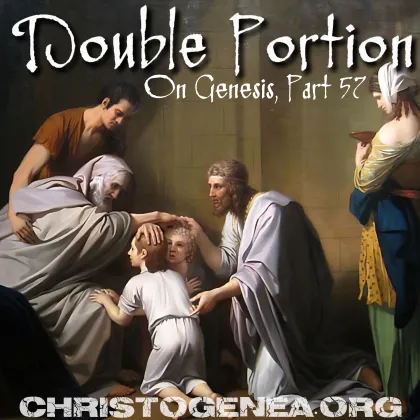
On Genesis, Part 57: The Double Portion
Where we had left off with our commentary at the end of Genesis chapter 47, it had been determined that the sons of Israel would dwell in the land of Goshen, and it was also evident that the famine had, at least for the most part, run its course, so that Joseph was renting the land of Egypt back to the people so long as they paid pharaoh the fifth part of their annual yields. Seeing that, we remarked that a twenty-percent levy was far more equitable than the oppressive taxes which men in a supposedly “free” world are forced to pay to their respective governments today. But home ownership in this “free” world is a separate issue from today’s taxes, and people do not get it from the government. Instead, they acquire their homes from Jewish usurers, and the typical rental or mortgage rates are far higher than a fifth of the median income. Therefore by comparison, Joseph’s management of Egypt actually sounds quite appealing, and so does the medieval feudal system which it resembles.
At the end of that last presentation, we had a lengthy discussion about the wife of Joseph, Asenath, and we were obliged to discredit the assertions made by Howard Rand and others, that she, as well as Joseph’s pharaoh, were of the house of Shem. There is no proof of that assertion, and Rand did not provide any conclusive proofs in the articles where he had made it. Rather, we demonstrated that the evidence which he did offer as proof doesn’t actually support his assertions at all. The reference to a shepherd named Philitis which was made by Herodotus had described him as a common shepherd, and certainly not as a king. The Hyksos which were described differently as either “shepherd kings” or “captive shepherds” in the copies of the writings of Manetho which had been employed by Flavius Josephus were only one and the same group which was described in two different ways in two different copies of the manuscripts of those writings which Josephus had possessed. They were clearly not two different groups, as Rand had insisted, but one group which was associated with the late 15th Dynasty of Egypt, and according to our chronology, Joseph had received Asenath as a wife not long after he was thirty years old, which is at least forty years before that dynasty had taken control of Lower Egypt.
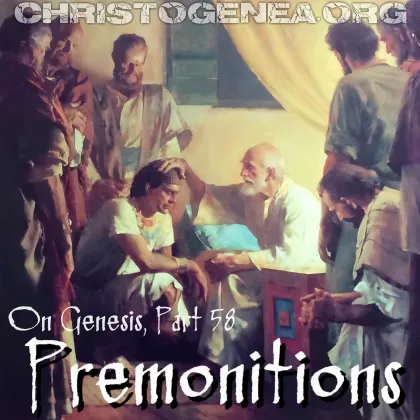
On Genesis, Part 58: Premonitions
As we have already discussed at length where Jacob had first blessed the sons of Joseph in Genesis chapter 48, thereby leaving his favorite son with the inheritance of The Double Portion, Jacob was ill and he knew that he was about to die, at the age of a hundred and forty-seven years, which was some time around 1648 BC. While Abraham had lived to be a hundred and seventy-five years old, and Isaac lived even longer, having attained a hundred and eighty years, the typical lifespans of men in general seem to have been gradually getting shorter over the many centuries which followed the Flood of Noah, and now at this point it has been fifteen hundred and thirty-eight years since that event had occurred. Following the death of his father, at which time he was about fifty-seven years old, Joseph would live to be only a hundred and ten, although Levi lived for a hundred and thirty-seven years and his son Kohath for a hundred and thirty-three (Exodus 6:16-18).
Perhaps Joseph’s shorter lifespan could be seen as an act of mercy by Yahweh God, rather than as a curse, as life gets more difficult for men as they advance in age. It certainly is evident that Jacob did not want to live as long as he did, and when he had first arrived in Egypt, at the age of a hundred and thirty, and he was reunited with Joseph, he is recorded in Genesis chapter 46 as having said to him: “30... Now let me die, since I have seen thy face, because thou art yet alive.” But perhaps Yahweh kept Jacob alive for another seventeen years so that Ephraim and Manasseh could receive his blessing as young men, rather than as young boys. The fact that Joseph and his two sons were blessed first by Jacob, and apart from the others, is quite significant, since they were the recipients not only of the double-portion of the inheritance, but they had also explicitly received the greater promises which were made to Abraham, and passed on to Jacob.
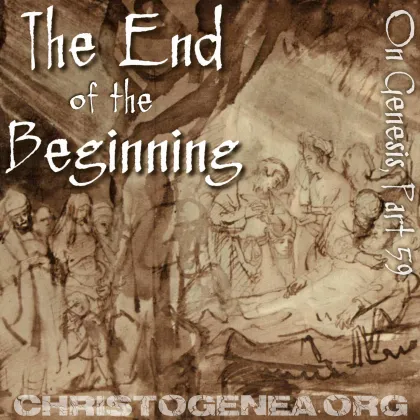
On Genesis, Part 59: The End of the Beginning
The first and last books of the Bible are its most important books. The book of Genesis is the story of the origin of our race, and the Revelation is the story of its destiny after its reconciliation to Christ. The entire purpose in the interim, is succinctly described by Solomon, in Ecclesiastes chapter 1 where he wrote that “13 … I gave my heart to seek and search out by wisdom concerning all things that are done under heaven: this sore travail hath God given to the sons of man to be exercised therewith.” With this, Paul of Tarsus agreed, and upon it he expounded, in Romans chapter 8 where he wrote: “18 Therefore I consider that the happenstances of the present time are not of value, looking to the future honor to be revealed to us. 19 Indeed in earnest anticipation the creation awaits the revelation of the sons of Yahweh. 20 To transientness the creation was subjected not willingly, but on account of He who subjected it in expectation 21 that also the creation itself shall be liberated from the bondage of decay into the freedom of the honor of the children of Yahweh.” By “creation” in that passage, Paul meant the Adamic creation, since later in the chapter he compared that creation to other elements of the creation of God.
So while the Greek word γένεσις means origin or beginning, and the book of Genesis describes the origin and beginning of our race, the Revelation describes the beginning of the end. While Genesis contains the promises to our race, the Revelation reveals how Yahweh God shall keep those same promises. Here as the book of Genesis closes, it offers an uncertain future for the children of Israel since it has already warned that they would be afflicted in Egypt, in the promises which Yahweh had made to Abraham in Genesis chapter 15. But in the final chapters of the Revelation, that end is described as having a more promising future, where it offers yet another beginning and the promise of something much greater than what this world has offered, although we continue to remain uncertain as to how that shall materialize.
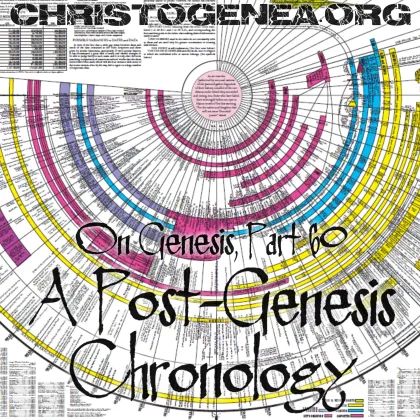
On Genesis, Part 60: A Post-Genesis Chronology
As we have often stated, one of the primary endeavors of this ministry is to provide Christian Identity with a firm academic foundation. That is because Christian Identity is Truth, and it certainly can be established in Scripture, history and archaeology that it is truth. Of course, our enemies can find ways to try to undermine us, just as they have found countless ways to criticize Scripture itself. But those ways are hardly honest, and always deceptive. One of the many avenues they have exploited in order to achieve their ends is Biblical chronology. They take simplistic interpretations of certain passages and use them to assert that somehow the Bible is false, that it can only be a collection of fairy tales, because, for example, there is no record in Egypt that the Israelites were in slavery there for four hundred years. But upon deep scrutiny of those same passages, and with an accurate understanding of Scripture and history, all of their attacks fail.
In recent weeks here we have concluded a commentary of the Book of Genesis, and in the course of that work we had provided a rather detailed chronology, using the Septuagint as our primary resource, which in this respect is certainly much more accurate than the translations which are based on the Masoretic Text, such as the popular King James Version. In that chronology, we asserted that among the last significant events in Genesis, Jacob had gone to Egypt with his family around 1665 BC, and since the call of Abraham was about 1880 BC, when the patriarch was 75 years old, and since Paul of Tarsus had written in Galatians chapter 3 that there were 430 years from the time of that call to the giving of the law at Sinai, the sojourn to Egypt was halfway through that period, leaving 215 years. So from the time Jacob went to Egypt, there would be another 215 years until the giving of the law at Sinai some time around 1450 BC. Moses, having been 80 years old at Sinai, must have been born some time around 1530 BC.
Christogenea is reader supported. This month's support level is reflected in the graph below. See our Contact page for a mailing address and other ways to support Christogenea.
77%